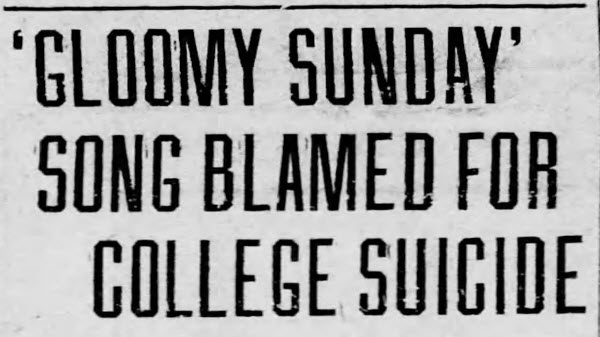Some describe music as the food for the soul due to its profound ability to impact the human psyche and shift emotional states. In the film industry, music is crucial for enhancing scenes, where actors address the eyes, while accompanying music engages the senses. Many films owe their significant success to their soundtracks. But can music’s influence be so intense that it drives listeners to suicide? This question might sound peculiar, but it’s indeed a reality linked to a song called “Gloomy Sunday,” which some blame for nearly 100 suicides simply because its listeners heard it.
“Gloomy Sunday” is a melancholic song released in 1932, composed by Hungarian pianist and musician Rezső Seress and written by poet László Jávor. The song’s lyrics depict a singer asking his deceased lover to join him in his planned funeral, expressing a desire to be with his love in the afterlife. The song’s lyrics unambiguously hint at suicide, earning it the nickname “The Hungarian Suicide Song.” It was often blamed for suicides that occurred after people listened to it. While some may view these allegations as exaggerated due to unverifiable details, the song and its associated stories were widely covered in popular newspapers and magazines because of their eerie connection to numerous suicides.

Reports emerged with the airing of “Gloomy Sunday” on Hungarian radio, claiming at least 18 suicides were closely linked to the song. An article in Time magazine in March 1936, titled “Music: The Suicide Song,” recounted several suicides, including a Hungarian shoemaker named Joseph Keller, who left a note with some lyrics from “Gloomy Sunday” at his suicide site. Many bodies were found in the Danube River with items related to the song. Additionally, two individuals reportedly shot themselves while listening to the song performed by a band, among other cases. Due to the rising number of suicides, Hungarian authorities banned the song from being broadcast nationwide.

The suicides associated with “Gloomy Sunday” were not confined to Hungary. Reports also reached Time magazine and The New York Times about suicide attempts in the United States connected to the same song, which had an English version released in 1936. Consequently, some broadcasters, including the BBC in the UK, banned the song until 2002, and American stations also followed suit, fearing that its lyrics might inspire suicides. Some claim the number of deaths linked to the song exceeds 100, and various stories of suicides related to “Gloomy Sunday” circulate online. One story recounts a girl in Vienna who drowned herself while clutching the song’s sheet music, while another describes a woman in London who repeatedly listened to the song before overdosing on drugs.

Some refuse to link the song to the increase in suicides at the time, arguing that the real cause was the Great Depression, which led to bankruptcy and job losses for many, resulting in widespread poverty and subsequent suicides due to life problems unrelated to the song. However, others insist that “Gloomy Sunday” was a significant factor, justifying their view by noting that the composer was deeply troubled and poured his despair into the music, creating rhythms potent enough to induce deep depression or suicidal tendencies. Additionally, the lyricist had recently broken off his engagement, and this emotional turmoil inspired the song’s sorrowful lyrics. When combined, the lyrics and melodies reportedly led many to suicide. Even the composer, Rezső Seress, succumbed to his own depression, ultimately jumping from his apartment building in Budapest and committing suicide after his sixty-ninth birthday. He once said that standing amid the “killer success” of his song felt like being a man accused, describing the song’s fame as painful. Seress claimed he did nothing but express his heartaches through the song’s melodies, and it seems that others who shared his sentiments found their wounds reflected in it.
